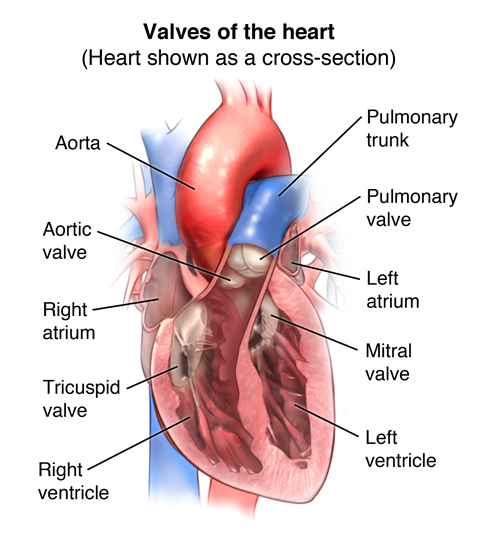About the Heart Valve Institute
The Heart Valve Institute focuses on treating disorders of the valves of the heart and specializes in the use of minimally invasive technology, avoiding open heart procedures whenever possible. Our multi-disciplinary team consists of:
- General cardiologists
- Interventional cardiologists
- Cardiovascular surgeons
- Vascular surgeons
They are among an elite group of cardiologists and surgeons trained and experienced in a variety of new procedures making heart valve repair and replacement more mainstream.
Our Philosophy
Many hospitals rush to perform traditional open-heart procedures to replace heart valves. The Heart Valve Institute’s interventional cardiologists and surgeons take a different approach. Our physicians work to repair damaged valves using breakthrough, minimally invasive procedures instead of open-heart surgery whenever possible and advisable.
Our Mantra:
- Repair first!
- No surgery – when avoidable
- Early diagnosis means early treatment
Our Process
- Assessment - If you have not been formally diagnosed by a physician, the first step is to talk to a professional to see if you are experiencing basic heart valve-related symptoms.
- Scheduling - Once you have decided to visit the Heart Valve Center at Oklahoma Heart Hospital, you will need to schedule your appointment. For out-of-town patients, we have bundled medical, hotel and food costs into an affordable price to ease the burden of an overnight stay.
- Focused Diagnosis - Your first day(s) at the Heart Valve Center will be spent undergoing thorough diagnostic tests which may include:
- Physical Exam
- Chest X-Ray
- Transthoracic Echocardiography
- Transesophageal Echocardiography
- Stress Echocardiography
- Nuclear Scanning
- Cardiac Catheterization
- Discussion of Treatment Options - Based upon the findings of your diagnostic tests, treatment options will be presented to you. There are a number of possible treatments, including:
- Lifestyle changes to ease a minor valve problem
- Medical management
- Surgery (for more serious valve problems)
- Abbott - MitraClip
- TAVR - Transcatheter Aortic Valve Replacement
- Traditional Open Heart Surgery (valve repair or replacement)
- Treatment Decision and Scheduling - Our team of highly trained and experienced cardiologists and surgeons will administer the treatment option that best fits your needs.
Minimally Invasive Treatments
Transcatheter Aortic Heart Valve Replacement (TAVR)
Understanding that simply diagnosing a condition can be a complicated process, our Heart Valve Institute created a one-day diagnosis methodology. Our unique workflow provides a one-day, multi-specialist, all-inclusive diagnostic workup with appropriate tests, review and consultation by cardiologists, internal medicine specialists, and surgeons in a process designed to provide a complete diagnosis and treatment options to patients by the end of the day with only one visit to the hospital.
Accomplishments
Over 200 TAVR procedures performed - Oklahoma Heart Hospital’s Heart Valve Institute is the most experienced TAVR center in the state of Oklahoma.
Read More about TAVR here:
What is Heart Valve Disease?
Heart valve disorders can arise from two main types of malfunctions:
- Regurgitation (or leakage of the valve). The valve does not close completely, causing the blood to flow backward through the valve. The heart is forced to pump more blood on the next beat, making it work harder.
- Stenosis (or narrowing of the valve). The valve opening becomes narrowed, limiting the flow of blood out of the ventricles or atria. The heart is forced to pump blood with increased force in order to move blood through the narrowed or stiff (stenotic) valve.
Heart valves can develop both malfunctions at the same time (regurgitation and stenosis). Also, more than one heart valve can be affected at the same time. When heart valves fail to open and close properly, it can be serious, possibly hampering the heart's ability to pump blood adequately through the body. Heart valve problems are one cause of heart failure.
4 valves of the adult heart
- Tricuspid valve – Located between the right atrium and the right ventricle.
- Pulmonary valve – Located between the right ventricle and the pulmonary artery.
- Mitral valve – Located between the left atrium and the left ventricle.
- Aortic valve – Located between the left ventricle and the aorta.

Read more about heart valve diseases
Call for an Appointment
Toll-Free: 1-855-286-3600
Meet Our Team
- Mohammad K. Ghani, M.D.
- R. Mark Bodenhamer, M.D.
- John D. Randolph, M.D.
- Jeffrey V. Garrett, M.D.
- Naeem K. Tahirkheli, M.D.
- Imran Virk, M.D.
- Stacie Hanes, RN, CCRC (Valve Clinic Manager)




